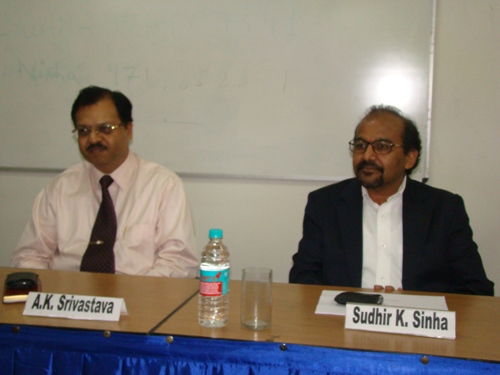31 Aug 2010|Noida | Amity University Campus, Sector-125 Noida
Amity School of Rural Management organises its second interactive session with Country Head, CSR and R&R in ArcelorMittal India

Amity School of Rural Management organized its second CEO-Student Interactive programme, for the students of MBA - Rural Management on the subject, "Corporate Social Responsibility towards the Rural Society, at Amity University Campus, Noida, Sector 125.
Mr. P.C Sabharwal, Director, Amity School of Rural Management and Er. A.K Srivastava- Director, Amity School of Urban Management welcomed Mr. Sudhir. K. Sinha, Country Head, CSR and R&R, ArcelorMittal, India. ArcelorMittal is the world leading steel company, with operations in more than 60 countries.
Mr. Sudhir. K. Sinha, while interacting with the students expressed his pleasure for having the opportunity to be a part of the programme and shared with students briefly about ArcelorMittal. The interaction between the students and Mr. Sinha elaborated on What is Corporate Social Responsibility (CSR), its basics, emergence, benefits and also what CSR is not. He emphatically distinguished between the concepts of CSR and charity and clearly stated of CSR being no legal or regulatory compliance.
Mr.Sinha defined CSR as an added sum total of “doing right and doing well.” He shared that CSR is an evolving market based on response to wide ranging challenges that corporates are currently facing. He advised students to deeply involve themselves in the interaction to trade in concept and understanding of the modern history of CSR which goes back to 1970, which witnessed major events such as attempt by the UN center on Trans National Companies (TNCs) to develop an international code of conduct for TNCs, Nestle boycott & the development of the WHOs International code on the marketing of breast-milk substitute and activities of the anti-apartheid movement targeting TNC’s with operation or business relations with South Africa.
The interaction outlined the phases of evolution of CSR during 1945-2005. Vivid examples like the Satyam case and Vedanta were cited, inviting greater interactivity and participation. Mr. Sinha prominently explained the chief models of CSR (philanthropic model, Compliance model, Shareholder model, emerging global perspective or stakeholder model). Students enthusiastically discussed with Mr. Sinha, about CSR being a dynamic process that is factored by various business drivers such as values, brand image, reputation, philanthropy, mitigation of business challenges, operation risks and improvement of sales revenue.
Mr. Sinha urged the students in grasping the benefit of CSR, in terms of social image of the brand that broadly, minimizes business risks, maximizes economic gain and enhances reputation and brand image. He also shared with the students the current global trends in CSR and its importance in the times to come.